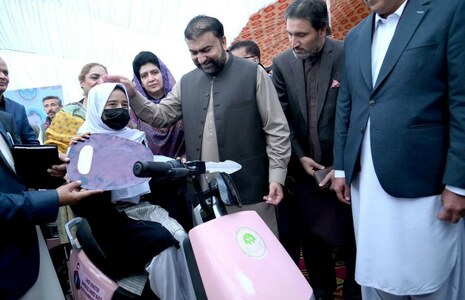GWADAR: As religion is being exported worldwide, the need to question everything around is more important than ever, writer Shah Mohammad Marri said while addressing a packed hall at the Second Gwadar Book Festival.
The first day of the festival, being held at the Syed Zahoor Shah Hashmi Auditorium from Jan 22 to 25, attracted a large number of men, women and children. Sessions on creation and individuality and painting exhibitions of artists from Balochistan and Chahbahar, Iran, are also being held.
Mr Marri spoke about the need for understanding and religious tolerance, and with biting wit and sarcasm, raised questions about many of the longstanding issues facing Balochistan. More importantly, he questioned the reaction of the community towards some of the defining changes in the province and how looking at the past could actually help. “I can quote some of the internationally renowned writers and scholars about finding your strength etc but I won’t. Because we already have our own literary giants who have given us much more to read and understand than we make an effort to,” he said.
Among the writers, he mentioned Mubarak Qazi and this being the right time to read him, rather “than a Bugti or a Marri writer”, because, he said, “we need to look beyond surnames to read writers and understand the context of what they speak about”.
“I notice that while being immensely strong, we have accepted the fact that we are weak, while having resources we have accepted that we have nothing. This won’t help us in the long run, as reality is different than what we see around us.”
As an example, he spoke about the persecution of the Shias and the recently targeted community of Zikris. “We need to see who is telling us the difference between a Zikri and a namazi or the difference between a Shia and a Sunni or that someone is a sardar and needs to be respected. These differences can be diminished if we meet and speak to each other. Questioning the widely accepted sardar will change our future.”
At the same time, he spoke about the need for the Baloch to meet and interact also, as he gave an example of his hometown, Kohlu, where he said people were either being killed or killing each other over the same differences. “You people are fortunate to be born at a time where you can take inspiration from the literary past as well as the present to decide your future.” Literature, he stressed, could soften the hardest of hearts.
The chief minister’s spokesperson Jan Mohammad Buledi spoke at the opening ceremony earlier about the need to “leave behind radicalisation by reading, writing and promoting such cultural festivals”.
A week ago, there was a crackdown on bookshops selling Islamic books and pamphlets, by the local administration. The move came a month after a militant attack on a school in Peshawar. With schools under threat in Panjgur in central Makran, Gwadar is facing a smaller but imminent threat of radicalisation as well, locals say.
Organiser Nasir Rahim from the Rural Community Development Council (RCDC) said that being part of the Makran belt, people of Gwadar were nationalist by nature and progressive by thought.
He said: “Radicals are more organised and hold stronger conviction for their cause. Most of us who think of ourselves as progressive are divided into factions. In our festival also, those that we consider radicals were the first ones to reach Gwadar and were around to help all the time.”
The organisers invited writers and poets from Karachi but only three could make it to the event. Mehardar forum, Islamic Research Academy, Karachi, and Jamaat-i-Islami arranged book stalls which by the end of the first day did a business of Rs42,000, the organisers said.
Paintings by artists from Quetta, Gwadar and Iran were displayed. They included sketches, acrylic painting and water painting by a student, Shaheena Rasheed, from Quetta’s Balochistan University, Nazeer Ahmad from Gwadar and Abdul Basit Sheikhi from Iran Shahar. The former two focused on the need to follow individual choices.
Mr Marri added in his concluding speech of the day: “The advantage of having scholars and literature is that they know the trick of bringing one out of their compartmentalised thoughts and believe things not possible otherwise.”
Published in Dawn January 24th , 2015
On a mobile phone? Get the Dawn Mobile App: Apple Store | Google Play














































